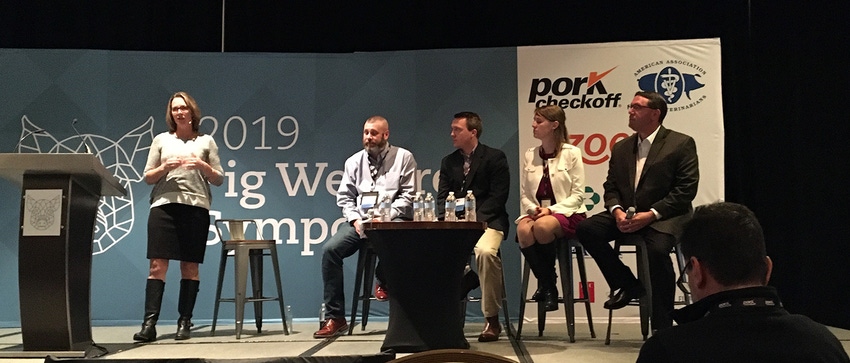Having an animal welfare culture involves experienced, empowered employees and involvement from the top down.

Collette Kaster likes to remind customers the current animal welfare programs implemented across the United States didn't happen overnight. It's been a 30-year process.
"We didn't just develop programs or audits or standards and have those things be implemented and go on our way," Kaster says. "Whether we're talking about animal welfare, food safety or environmental criteria, they take a period of time to develop, and there's usually a lot of factors happening simultaneously."
The executive director of the Professional Animal Auditor Certification Organization told attendees at the 2019 Pig Welfare Symposium during the panel discussion, "Evolution of Animal Welfare Programs in the Supply Chain," it's also important to remember animal welfare isn't just auditing. Auditing is just one portion of a pork production system's robust animal welfare program.
"You can have an audit culture, or you can have an animal welfare culture, and audit culture is about just getting through it, making sure you pass and then going back to doing business," Kaster says. "I like to think that in the pork processing, in both the farm as well as in the meat processing, that we are evolving to a culture of animal welfare and husbandry; and the way we do that is training and accountability."
Kaster acknowledges that takes experienced, highly trained, empowered employees, which is not easy to find in today's low unemployment rate climate. However, having an animal welfare culture also involves involvement from the top management down.
"The most successful systems are always those ones where senior management is out and about, in the country, their boots are on the ground, they're interacting with the people and feeling what's happening in the operation," Kaster says
Paul Ayers, animal care manager for The Maschhoffs, has had his boots on the ground for more than 10 years with the pork production system, leading a team of associates to help implement animal care initiatives across all of their production regions and providing support when needed.
"I think probably one of the biggest benefits I've seen with audits is it sets very clear expectations. There is a saying that I use: 'You can't win if you don't know the rules' and I think at the end of the day all pork producers, and caregivers want to do the right thing and sometimes just need clarification on what the rules are," Ayers says. "I think audit programs and the evolution of PQA (Pork Quality Assurance) and the Common Swine Industry Audit has really helped define what those rules are and position our caregivers for success."
Prior to the widespread adoption of auditing, Ian Levis, Operations and Vet Services manager for Seaboard Foods of Iowa, says the pork production system was routinely conducting internal production audits and using PQA Plus assessments in their efforts. However, when they started seeing more audit requests coming from customers, Seaboard Foods incorporated third-party verification audits in addition to the internal audits done routinely, something Levis says has worked well for independent verification and transparency across the entire system.
"It's integrated as far as we have people certainly dedicated to doing CSI audits now and conducting the PQA training of our employees," Levis says. "As we've gone through time, an even larger portion is making sure specific points are heavily covered by our internal production audits."
After an audit, Levis says he often tells the team to not focus so much on the points, but to use the opportunity as a time to further educate staff.
"I think the main thing has been staying away from what the score was and using that as a tool to get better for the industry and move the organization forward, not as 'a gotcha moment,''' Levis says.
Ayers agrees. One of the challenges he's seen with third-party audits and internal audits has been ensuring it's not creating solely an audit culture.
"Unfortunately, we've had times in our history where animal care was known as the 'animal care cops.' We came out, did audits, left and I don't think it was very sustainable long term," Ayers says.
One of the ways The Maschhoffs has combatted that is to try to pair the individuals who are doing audits with the production team, so they can understand production challenges and support them above and beyond an audit.
"Auditing is only a snapshot. It's very easy for us to say, 'we have an issue, so we are going to go audit,''' Ayers says. "Auditing is only one component of the continuous improvement process and we've worked hard to position our team to be more involved in training, on follow-up actions, getting out on farms on an informal basis, rather than just audits."
Several years ago, when The Maschhoffs started implementing internal assessments and auditing in their system, Ayers says the word audit was often skewed. That has changed today.
"I think we've come to see that there's definitely value in audits and we've transitioned from using audits as a 'check-the-box' compliance to using them as a way to build trust within our system and our customers, and now we're evolving to utilize them to try to add value," Ayers says. "I don't think animal welfare audits and production are mutually exclusive. If we're doing the right thing for animal welfare, you should see production improvements as well."
About the Author(s)
You May Also Like





